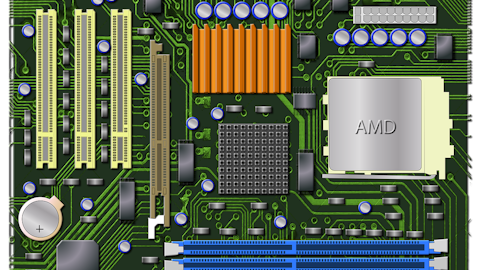The rumor of Microsoft Corporation (NASDAQ:MSFT) having an interest in Advanced Micro Devices, Inc. (NASDAQ:AMD) is making the rounds in the market. The rumor originated when gaming site KitGuru mentioned that the software giant approached the chipmaker several months ago. The software company is said to have interest in improving its chip design operations. Shares of Advanced Micro Devices were up by 4.55% on July 2, though they are still down by about 5% this year, and 40% over the past 12 months, lowering its market cap to $1.97 billion in the process, mere pocket change for Microsoft.
There are different viewpoints at work, with some experts considering it a potentially profitable venture for the company, as Microsoft, which is one of the biggest software companies in the World, has spent $1.2 billion on the purchase of chips for Xbox One since its launch on November 22, 2013, and the small market cap makes it an easy acquisition target for Microsoft, which has cash reserves of close to $100 billion. Advanced Micro Devices, Inc. (NASDAQ:AMD) is focusing towards leading gaming consoles and low-power servers to cope with the losses it has incurred because of lower PC sales. The chipmaker reported losses of $180 million in its recent quarter against the prior year loss of $20 million.

On the other side of the table is Microsoft Corporation (NASDAQ:MSFT), the tech giant that had a market cap of $642 billion during its peak in 2000, which is trying hard to make a comeback in the current tech environment with its “mobile-first, cloud-first” approach initiated by Satya Nadella, CEO of Microsoft Corporation. Microsoft is targeting enterprise consumers with Microsoft Surface Hub, which promotes cloud services and comes with powerful team collaboration features for the modern business environment, and cloud computing solutions. Its latest version of the Windows operating system, Windows 10, is ready for launch on July 29 and the company is offering it as a free upgrade to its Windows 8 users. The tech behemoth still has 93.5% market share in the PC industry against Apple Inc (NASDAQ:AAPL)’s 6.5% share in the first quarter of 2015. Microsoft is planning to up its share in the mobile operating system market thanks to the fact that Windows 10 will work on all devices including PCs, tablets, and mobiles.
The shares of Microsoft Corporation have also struggled of late, declining 5.66% year-to-date. Upon analyzing the hedge fund sentiment for the Windows OS company, smart money is slightly bearish, with 110 hedge fund investors investing $16.13 billion at the end of the first quarter against aggregate investments of $17.87 billion made by 114 hedge fund managers at the end of the previous quarter. Jeffrey Ubben of ValueAct Capital holds the largest stake in Microsoft Corporation (NASDAQ:MSFT) among the hedge funds we track, with 75.27 million shares worth $3.06 billion.
On the other hand, hedge fund sentiment is positive for Advanced Micro Devices, Inc. (NASDAQ:AMD), with 15 hedge fund investors holding $36.33 million of the company’s shares on March 31 compared to holdings of $28.34 million from 12 investors on December 31. David E. Shaw’s D. E. Shaw is among the primary stakeholders of the chipmaker, investing $13.00 million in the company through ownership of 4.85 million shares. Insiders have not made any open market sales or purchases over the past six months in either company. Some of the common hedge fund investors with positions in both Microsoft Corporation (NASDAQ:MSFT) and Advanced Micro Devices, Inc. (NASDAQ:AMD) include D E Shaw, Cliff Asness’ AQR Capital Management, and Ken Griffin’s Citadel Investment Group.
A potential merger between Microsoft Corporation (NASDAQ:MSFT) and Advanced Micro Devices, Inc. (NASDAQ:AMD) may or may not happen in the near future but it is clear from the overall hedge fund involvement that they weren’t betting large amounts on AMD, despite growing slightly more bullish. In fact, hedge funds were 70% underweight AMD, which suggests they weren’t predicting any such merger and may not be counting on one even now despite the latest rumors.
Why are we interested in the 13F filings of a select group of hedge funds? We use these filings to determine the top 15 small-cap stocks held by these elite funds based on 16 years of research that showed their top small-cap picks are much more profitable than both their large-cap stocks and the broader market as a whole. These small-cap stocks beat the S&P 500 Total Return Index by an average of nearly one percentage point per month in our backtests, which were conducted over the period of 1999 to 2012. Moreover, since the beginning of forward testing from August 2012, the strategy worked just as our research predicted, outperforming the market every year and returning 135% over the last 34 months, which is more than 80 percentage points higher than the returns of the S&P 500 ETF (SPY) (see more details).
Disclosure: None





